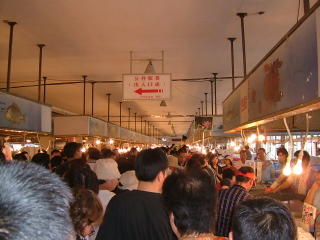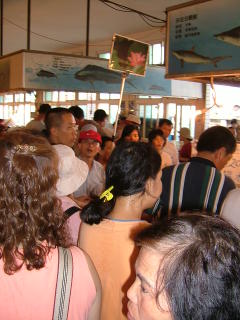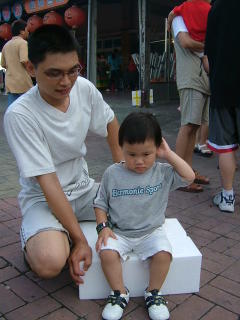In the latest Chronicle of Higher Education, Donald Hall writes about faculty life in U.S. and European universities. Some of what he mentions about European universities (heavy teaching loads and comparatively low pay, in particular) sound quite familiar to me. On the other hand, the cost of living isn't quite as high here as it is in European cities, I don't think. Probably not even as high as in major U.S. cities, I would guess. And then there's what he says about academic administration in European universities, which may or may not be similar to the situation here. ("May or may not," that is...)
Tuesday, July 05, 2005
Security threat for PHP-based blogging
Netcraft reports that PHP-based blogging programs have been found to have a security hole:
Many popular PHP-based blogging, wiki and content management programs can be exploited through a security hole in the way PHP programs handle XML commands. The flaw allows an attacker to compromise a web server, and is found in programs including PostNuke, WordPress, Drupal, Serendipity, phpAdsNew, phpWiki and phpMyFAQ, among others.(via Michael Jacques)
English articles on aftermath of chemical plant fire
Image of run-off from the scene of Sunday's fire
(from Yahoo!-Kimo News)
Here are a couple of articles in the English-language newspapers about Sunday's fire at the chemical plant:
- Taichung air safe despite smoke, officials say, from the Taiwan News
"The major reason for the water (from the scene of Sunday's fire) turning yellow was because of the 30 percent of hydrolysis protein found in the chemical fire-fighting foam," the Cabinet-level Environmental Protection Administration explained in a statement released later yesterday.
The statement acknowledged that the concentration of sodium nitrite and nitrate nitrogen in the creek was on the high side but did not exceed levels considered safe.
- Pollution from blaze at 'acceptable levels:' EPA, from the Taipei Times
Yesterday, two filtering systems in nearby rivers were established. Seven trucks collected sludge from the rivers and sent them to sewage plants for treatment. EPA officials said that the yellow color in the rivers is normal because decomposition of nitrate released from the factory had been processed in water.
The pH level of river water also remained at "acceptable levels," the EPA said. Since the river water is not source for drinking water, the public should remain calm, officials added. However, agricultural agencies in charge of irrigation management will be closely monitoring the river in the near future.
- New fire at Taichung plants under control, from the China Post
Sunday, July 03, 2005
Industrial park fire in Taichung
Turned on the news earlier this afternoon to hear that a big fire was going on at a chemical plant in the industrial park near Tunghai. Thick black smoke could be seen pouring out of the burning plant. Evidently some sodium nitrite was in danger of spreading over the city as well. According to a recent report on Yahoo!-Kimo's news site (in Chinese), the fire is under control now and there wasn't any evidence of dangerous chemicals in the air.
[Update, 9:25 p.m.: Now Zhongtian news is reporting that chemicals have leaked into the Fazi River. From what I know, the Fazi is the only major river left in Taichung City that still had fish swimming in it (although I imagine the new "Science Park" they're building in Xitun will take care of that sooner or later). No news yet on how they plan to clean up the river, but the news was showing a lot of a thick foamy substance in it.]
[Update, 7/5/05: 12:10 a.m.: A lot of the fish that I mentioned above are turning up dead now.]
[Update, 9:25 p.m.: Now Zhongtian news is reporting that chemicals have leaked into the Fazi River. From what I know, the Fazi is the only major river left in Taichung City that still had fish swimming in it (although I imagine the new "Science Park" they're building in Xitun will take care of that sooner or later). No news yet on how they plan to clean up the river, but the news was showing a lot of a thick foamy substance in it.]
[Update, 7/5/05: 12:10 a.m.: A lot of the fish that I mentioned above are turning up dead now.]
Saturday, July 02, 2005
Taiwan's indigenous channel
Among other news sources, the BBC reports on Taiwan's new cable network--ITV (Indigenous Television Network), which will broadcast programs focusing on aboriginal groups here.
Aboriginal groups, who account for less than 2% of Taiwan's population, have long complained the mainstream media either neglects or misrepresents them.
They see the new channel as a historic chance for their own voices to be heard, not just in Taiwan but around the world through collaboration with other indigenous television programmes.
The 12 aboriginal tribes in Taiwan, who trace their roots back 6,000 years, have their own traditions and languages, although the new station will mainly broadcast in Mandarin Chinese.
Friday, July 01, 2005
CiteILike...
After reading through Kerim's very helpful CiteULike tutorial on Savage Minds, I now have my own library of citations. It even has its own RSS feed! Cool!
Wednesday, June 29, 2005
125% slang, all the time...
Your Slanguage Profile |
| British Slang: 25% |
| Canadian Slang: 25% |
| Prison Slang: 25% |
| Southern Slang: 25% |
| Victorian Slang: 25% |
| Aussie Slang: 0% |
| New England Slang: 0% |
Monday, June 27, 2005
Areté has an inspiring post on taking a meeting with oneself--I think I'll follow her (and S.'s) example...
Sunday, June 26, 2005
It must have been "Foreigner Day" at the Taichung Harbor fish market today...
Michael Turton went to the fish market with his family and friends this morning and posted his pictures while we were at the fish market with my sister-in-law, brother-in-law, and their son. He's got some beautiful shots, and I'll try not to post "repeats" of his pictures...
 When Michael and his family went, there weren't many people there. But by the time we got there...
When Michael and his family went, there weren't many people there. But by the time we got there...

This fish was just taking a rest--I think it had heat stroke, like I had.

These fellas look kind of prehistoric... From what I could find on the web, they're called "Chikamekintoki" in Japanese...

There were some devout Buddhists at the fish market today, buying (and asking other people to buy) live fish so they could release them back into the water. They didn't appear particularly successful... (They're the people in the back holding up the red sign with a picture of a lotus on it.)

"Dragon's Intestines"--actually the intestines of mambo fish.

Our nephew found another use for the styrofoam coolers Michael mentions...
OK. What's our next outing gonna be, Michael? (heh)
 When Michael and his family went, there weren't many people there. But by the time we got there...
When Michael and his family went, there weren't many people there. But by the time we got there...
This fish was just taking a rest--I think it had heat stroke, like I had.

These fellas look kind of prehistoric... From what I could find on the web, they're called "Chikamekintoki" in Japanese...

There were some devout Buddhists at the fish market today, buying (and asking other people to buy) live fish so they could release them back into the water. They didn't appear particularly successful... (They're the people in the back holding up the red sign with a picture of a lotus on it.)

"Dragon's Intestines"--actually the intestines of mambo fish.

Our nephew found another use for the styrofoam coolers Michael mentions...
OK. What's our next outing gonna be, Michael? (heh)
Saturday, June 25, 2005
Another interview about Taiwan
Konrad Lawson, on his blog Muninn, relates a chat he had with an elderly Taiwanese couple at a coffee shop in Taipei. They talked mostly in Japanese. It's an interesting read. Here's one paragraph to pique your interest:
When the war ended and Taiwan reverted to the control of Nationalist Chinese forces, he finished his high school education in Taipei though all of his classes switching suddenly from Japanese to Chinese. The couple said that the switch was particularly difficult for elementary school teachers who had to study Chinese via the radio and change their materials from Japanese to Chinese, while junior and high school teachers came largely from China. After graduating the husband was accepted to and went to Zhongyang University in Nanjing after turning down an offer from Taiwan National University. The year was 1948 and within only a few months of starting college, he would be fleeing Nanjing with the rest of the Nationalist government and his fellow students as the Nationalist forces started crumbling in the face of Communist advances.
Link to the former native speaker's abode
I found our apartment complex (or "community," as they often call it here) using Google's satellite images: here it is, in case you're interested. We're in the building in the middle of the picture. Tunghai University is here, with the FLLD building in the middle (the big building to the far left that looks like a rectangular donut is the university library).
By the way, I heard on the news that Taiwan's government is worried about the easy availability of satellite images of the island. They're worried that our enemies will be able to get free images of Taiwan's military bases through Google Maps.
[Update, 10:06 p.m.: Also took a trip to China--I think this is the Forbidden City, right?]
By the way, I heard on the news that Taiwan's government is worried about the easy availability of satellite images of the island. They're worried that our enemies will be able to get free images of Taiwan's military bases through Google Maps.
[Update, 10:06 p.m.: Also took a trip to China--I think this is the Forbidden City, right?]
Friday, June 24, 2005
Amazing!
Am listening to an interview I did yesterday, using my MP3 player for the first time. It is SO clear! I'll never go back to bulky cassette recorders...
And the interview went quite well, too--the interviewee was able to take a lot of my "yes-no" questions (note: don't ask so many yes-no questions next time!) and talk for quite a while on them. I got a lot of good stories, too, that will make my dissertation not so dry. He was definitely better at being interviewed than I was at interviewing!
And the interview went quite well, too--the interviewee was able to take a lot of my "yes-no" questions (note: don't ask so many yes-no questions next time!) and talk for quite a while on them. I got a lot of good stories, too, that will make my dissertation not so dry. He was definitely better at being interviewed than I was at interviewing!
Preparing for ISHR
I found out Tuesday afternoon that Tunghai has accepted my proposal for a travel grant to present a paper at the conference of the International Society for the History of Rhetoric. I was a little worried I wouldn't get the grant because, as you can see from my abstract, I'm not going to be talking about English teaching. (Actually, I could probably make a decent argument that it relates to the work we do in the intercultural communication class I teach here.) So I'm grateful to Tunghai for agreeing to help foot the bill for my trip to LA in July.
I'm shortening the paper to focus mainly on post-war Taiwan because I don't think I could cover both colonial and post-war Taiwan adequately in a 20-minute presentation. (I found out in April how hard it was to cover to any depth a few presidential inaugurals in 20 minutes!) The paper explores some issues pertaining to how the KMT government defined the Chineseness that it encouraged (or perhaps "coerced" is a better word in some cases) the people of Taiwan to identify with--specifically, "Chinese" as equal to "citizen of the Republic of China, temporarily exiled to the island of Taiwan but diligently at work on recovering the nation from the Russian Communists and their puppet Mao Zedong" (or something along those lines). I'm arguing that in order to have an understanding of the complexities of 20th-century Chinese rhetoric, it's necessary to look at competing notions of Chineseness rather than focusing only on rhetoric that is considered Chinese simply because it is produced on the Chinese mainland--though admittedly, the mainland figures prominently into the notions of Chineseness that the KMT on Taiwan emphasized. I argue that it's important to pay attention both to the claims the KMT government made about how it represented the last bastion of true Chineseness in the world, and to the "contents" of the Chineseness that the R.O.C. on Taiwan represented. (Why, for instance, some Republican era Chinese writers and thinkers were acceptable and others, such as Lu Xun, weren't. Or why some aspects of language simplification were acceptable and others weren't.) The main angle on this that I will take is how what I call "the rhetoric of Chineseness" was fundamental to educational theory and practice in early martial-law Taiwan, particularly in terms of learning to use language/rhetoric. Learning was in large part, as Richard Wilson wrote 35 years ago, "learning to be [a particular kind of] Chinese" or learning to speak and write as a particular kind of Chinese.
Most of what I will have to say would probably be no surprise to anyone who has lived in Taiwan for a while (and hasn't been asleep the whole time) or has read about Taiwan. (In fact, there's some interesting material at--of course!--Scott's blog about some of this.) But Taiwan hasn't had much representation, to my knowledge, at international rhetoric conferences, though there have been some good articles on Taiwan in NCA/Sage's Intercultural and International Communication Annual (see here for links to tables of contents). In fact, while there are about half a dozen scholars from the mainland who will be at ISHR, I'm the only one I know of who is coming from Taiwan. (A-chin Hsiau of the Academia Sinica was going to present what looked like an interesting paper, but won't be there.) So again I'm in the odd position of being the "foreigner" representing Taiwan at an international conference. Hope that's not always the case...
I'm shortening the paper to focus mainly on post-war Taiwan because I don't think I could cover both colonial and post-war Taiwan adequately in a 20-minute presentation. (I found out in April how hard it was to cover to any depth a few presidential inaugurals in 20 minutes!) The paper explores some issues pertaining to how the KMT government defined the Chineseness that it encouraged (or perhaps "coerced" is a better word in some cases) the people of Taiwan to identify with--specifically, "Chinese" as equal to "citizen of the Republic of China, temporarily exiled to the island of Taiwan but diligently at work on recovering the nation from the Russian Communists and their puppet Mao Zedong" (or something along those lines). I'm arguing that in order to have an understanding of the complexities of 20th-century Chinese rhetoric, it's necessary to look at competing notions of Chineseness rather than focusing only on rhetoric that is considered Chinese simply because it is produced on the Chinese mainland--though admittedly, the mainland figures prominently into the notions of Chineseness that the KMT on Taiwan emphasized. I argue that it's important to pay attention both to the claims the KMT government made about how it represented the last bastion of true Chineseness in the world, and to the "contents" of the Chineseness that the R.O.C. on Taiwan represented. (Why, for instance, some Republican era Chinese writers and thinkers were acceptable and others, such as Lu Xun, weren't. Or why some aspects of language simplification were acceptable and others weren't.) The main angle on this that I will take is how what I call "the rhetoric of Chineseness" was fundamental to educational theory and practice in early martial-law Taiwan, particularly in terms of learning to use language/rhetoric. Learning was in large part, as Richard Wilson wrote 35 years ago, "learning to be [a particular kind of] Chinese" or learning to speak and write as a particular kind of Chinese.
Most of what I will have to say would probably be no surprise to anyone who has lived in Taiwan for a while (and hasn't been asleep the whole time) or has read about Taiwan. (In fact, there's some interesting material at--of course!--Scott's blog about some of this.) But Taiwan hasn't had much representation, to my knowledge, at international rhetoric conferences, though there have been some good articles on Taiwan in NCA/Sage's Intercultural and International Communication Annual (see here for links to tables of contents). In fact, while there are about half a dozen scholars from the mainland who will be at ISHR, I'm the only one I know of who is coming from Taiwan. (A-chin Hsiau of the Academia Sinica was going to present what looked like an interesting paper, but won't be there.) So again I'm in the odd position of being the "foreigner" representing Taiwan at an international conference. Hope that's not always the case...
Tuesday, June 21, 2005
Friday, June 17, 2005
Link smorgasbord, with a picture of my dog thrown in for good measure
I've been playing around with Technorati tags for my posts, but I have a feeling this is going to defy any tag besides "miscellany"...
First the links--they're from my Bloglines feeds (which I'll make public one of these days, when I get around to it), so I want to post them here for future reference. In no particular order:
And now for Mei-mei:

Mei-mei, who lives with her "grandparents" in Hsin-she, likes to hang out around our car when we visit. She always looks forward to going on rides with us, even though those rides usually end up at the vet's where she gets her blood sugar checked...
First the links--they're from my Bloglines feeds (which I'll make public one of these days, when I get around to it), so I want to post them here for future reference. In no particular order:
- Alan Baumler discusses "[t]he question of China's existence or non-existence in the eyes of foreigners" on 井底之蛙, The China History Group Blog
- Shannon Parker of tonari no shibafu summarizes his sensei's advice on how to be a Japanese intellectual history scholar
- Clancy Ratliff of CultureCat browses MIT's OpenCourseWare and find some cool things on writing, feminism, new media studies, etc.
- Issues in Scholarly Communication notes Yahoo!'s new deep Web searching services, and
- ISC also excerpts an editorial from Library & Information Science Research on open access to research
And now for Mei-mei:

Mei-mei, who lives with her "grandparents" in Hsin-she, likes to hang out around our car when we visit. She always looks forward to going on rides with us, even though those rides usually end up at the vet's where she gets her blood sugar checked...

Alex Reid on assessment at SUNY
Came across a post by Alex Reid on "SUNYwide assessment and the failure of composition" that critiques the school's rubric for assessing the teaching of writing. Interesting...
Monday, June 13, 2005
A pile of grading to do + a temperamental online faculty information system =
teeth-grinding frustration + a brief hiatus from blogdom.
Friday, June 10, 2005
Don't know why I have time to do these things...
| Your IQ Is 120 |
Your Logical Intelligence is Above Average Your Verbal Intelligence is Genius Your Mathematical Intelligence is Exceptional Your General Knowledge is Exceptional |
Some blog entries on mentoring
There are a couple of interesting posts about mentoring over at the blog of the Synecdochic Prof (not to be confused with Schenectady Synecdoche--hmmm... wonder if they know each other?).
I'm particularly interested in this subject because I tried (unsuccessfully) to get a mentoring program started in my department. One of the reasons it failed was that a lot of people (including junior faculty) didn't feel a formal program was necessary--enough mentoring is done informally, I guess.
I'm particularly interested in this subject because I tried (unsuccessfully) to get a mentoring program started in my department. One of the reasons it failed was that a lot of people (including junior faculty) didn't feel a formal program was necessary--enough mentoring is done informally, I guess.
Subscribe to:
Posts (Atom)
